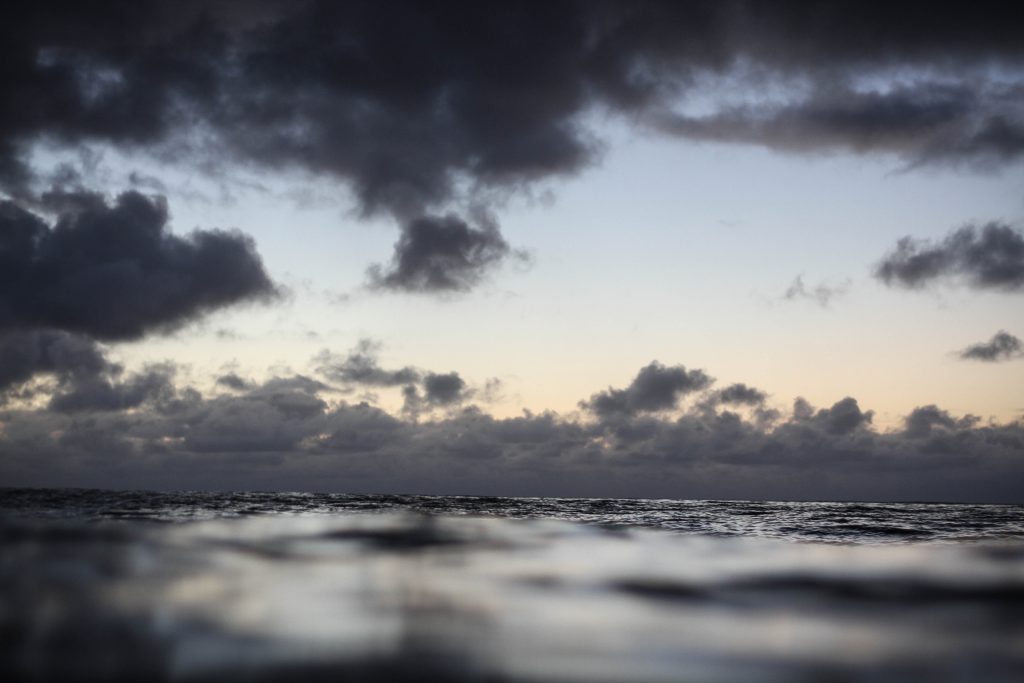
The Lt. Col. James B. Near Jr., USAF, ’77, Center for Climate Studies (NCCS) was founded in 2020. The NCCS serves the cadets/students and faculty of The Citadel and citizens of South Carolina by enhancing understanding of climate and its variability, change and risks through education, research, outreach and the development of public-private partnerships.
The NCCS now has an advisory board to assist in guiding its director, staff and Fellows in the development of atmospheric and climate science curriculum, place-based research and advancement of information promoting the design of sustainable, scientifically sound, technologically feasible, economically efficient and ethically defensible climate-risk management strategies.
NCCS Advisory Board members
Kevin Cooley, ’90
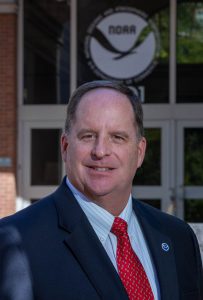
Cooley directs of Office of Planning and Programming for Service Delivery, for the National Oceanic and Atmospheric Administration (NOAA) National Weather Service (NWS). He ensures that the NWS has the capabilities needed to enable the provision of its climate, weather and water forecasts, watches and warnings to the American public and its public safety officials. Cooley oversees the planning, resourcing, development, fielding and operation of these essential mission capabilities. A primary example of such a capability is the NWS NEXRAD W88D Weather Radar used across the nation to enable effective severe weather forecasting and warning. He served in the U.S. Marine Corps for five years and in a civilian capacity for numerous military and federal government entities. Cooley’s NOAA biography can be read here. He graduated from The Citadel in 1990.
Kirstin Dow, Ph.D.
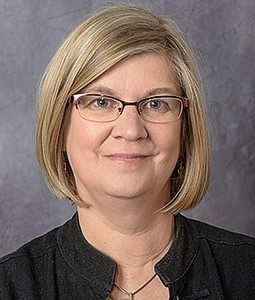
Dow is the Carolina Trustees Professor in the Department of Geography at the University of South Carolina. She is a social-environmental geographer focusing on understanding climate impacts, vulnerability, and adaptation using methods involving extensive participation of stakeholders and decision-makers. Dow serves as principal investigator of the Carolinas Integrated Sciences and Assessments (CISA) (www.cisa.sc.edu), 1 of 11 NOAA-supported Regional Integrated Sciences and Assessments (RISA) teams partnering with decision makers to bridge climate science and decision making in support of climate adaptation strategies specific to water resources, coastal regions, and public health concerns in the Carolinas. Dow’s full biography can be read here.
Fred Holland, Ph.D., ’64

Holland received a B.S. from The Citadel (1964) and his M.S. (1972) and Ph.D. (1974) degrees from the University of South Carolina. He has more than 45 years of technical and management experience in environmental sciences supporting state and federal governmental agencies. Holland held positions in the environmental consulting industry (vice president, Versar Inc. 1987-1991), state government (director, South Carolina Department of Natural Resources Marine Resources Research Institute 1991-2001) and federal government (director of NOAA’s Hollings Marine Laboratory and Center of Excellence for Oceans and Human Health 2001-2008). Holland also held academic positions with the College of Charleston, University of South Carolina, Medical University of South Carolina and the University of Maryland’s Chesapeake Biological Laboratory. Read more about Holland here.
Mike Johns, ’72
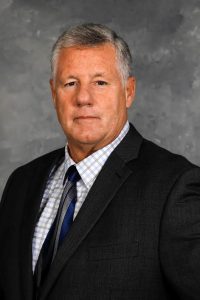
Johns graduated from The Citadel in 1972 with a Bachelor’s Degree in Biology. He also received a commission in the U.S. Air Force upon graduation. Johns went on to earn a Master of Science in Zoology and a Ph.D. in Marine Science from the University of South Carolina. Additionally, he earned an MBA from the University of Rhode Island. From 1976 to 1985, Johns was a principal investigator for the U.S. Environmental Protection Agency’s National Research Laboratory where he developed national guidance for addressing problems with chemically contaminated aquatic environments. He later worked in environmental consulting, eventually creating Windward Environmental LLC, which now has offices in three states and works to identify scientifically sound, environmentally sustainable remediation solutions for complex chemical pollution problems.
David Johnston
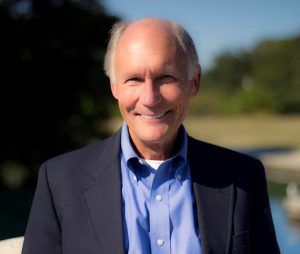
Johnston is a lawyer, advisor and businessman, with over thirty-five years of experience working with a broad range of private, non-profit and government organizations. He is the founder and CEO of Hamilton Advisors, LLC, a South Carolina-based company that advises organizations and their leadership on domestic and international challenges and solutions involving community resilience, collaboration and finance, with a special focus on water-related issues. Hamilton collaborates with organizations globally to achieve results for its client and their initiatives. Johnston has been a partner in major law firms and has served as corporate counsel for a number of public and private companies. His legal work focuses on complex corporate, securities, finance and environmental matters. Additionally, Johnston is chairman of the steering committee for the Charleston Resilience Network, and serves on the board of directors of the South Carolina Aquarium, the Medical University of South Carolina Neuroscience Advisory Board and Elements of Genius, Inc, Advisory Board.
Susan Lovelace, Ph.D.
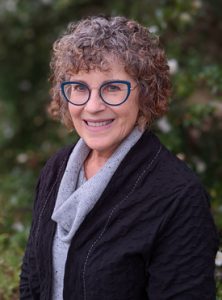
Lovelace is the executive director for the South Carolina Sea Grant Consortium. Her primary duties include administration of the agency and identifying the strategic directions for Consortium funded research, education and communication. She shepherds a multi-disciplinary staff as they work with researchers, businesses, communities and organizations to sustain, appreciate and wisely use the ecosystem services of our coastal area while understanding and responding to the challenges and opportunities of changes in climate and land use. Previously she was the Consortium’s assistant director for development and extension. Prior to this, she was manager of the Human Dimensions Research Program at the National Oceanic and Atmospheric Administration (NOAA) Hollings Marine Laboratory. Lovelace earned a Ph.D. in coastal resource management at East Carolina University, a B.S. in science education also at East Carolina University and a B.S. in Zoology at North Carolina State University. Read more about Lovelace here.
Hope Mizzell, Ph.D.
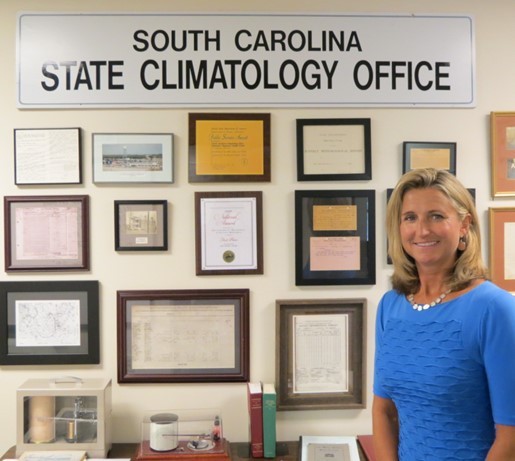
Mizzell has served as the South Carolina State Climatologist since 2003 and Supervisor for the South Carolina Flood Mitigation Program since 2014. The South Carolina Flood Mitigation Program is South Carolina’s coordinating agency for the National Flood Insurance Program. Hope’s responsibilities as State Climatologist include providing climatic information and meteorological interpretations, certifying climate records, overseeing the State’s Drought Response Program, providing emergency weather support, and conducting applied research to improve decision making activities. Dr. Mizzell has authored or co-authored studies on topics ranging from extreme rainfall, flooding, drought, and climate trends and variability. She began her career in 1992 as a Climatologist for the Southeast Regional Climate Center before advancing to Assistant State Climatologist for the South Carolina State Climate Office in 1995. She is the Past President of the American Association of State Climatologists. She received her Ph.D. focused on Climatology from the Department of Geography at the University of South Carolina in 2008.
Geoff Scott, Ph.D.
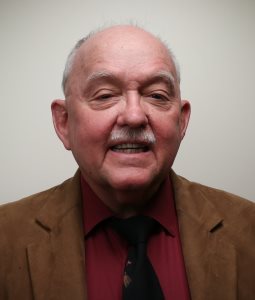
Scott received his Bachelor of Science in Biology from Wofford College, and his Master of Science and Ph.D. in Marine Science from the University of South Carolina. He is currently a clinical professor and chair of the Department of Environmental Health Sciences at the Arnold School of Public Health at the University of South Carolina. Scott is also director of the NIEHS Center for Oceans and Human Health and Climate Change Interactions housed in the Arnold School of Public Health with collaborating universities including the College of Charleston, The Citadel, Baylor University, Rutgers University and the University of Maryland. Some of Scott’s decades of research experience includes assessing impacts of the Ixtoc Well Blowout in the Gulf of Mexico; investigating hazardous waste sites, oil spills and Vibrio cholerae outbreaks in the Gulf of Mexico; assessing the impacts of agricultural pesticides, synthetic fuels and urban NPS runoff on coastal ecosystems; and measuring the health of coastal ecosystems and evaluating the impacts of changing landscape ecology from urbanization on ecosystem and human health.
Fellows of the Near Center for Climate Studies
- Jennifer Albert, Ph.D. (Education)
- Jennifer Balmer, Ph.D. (Biology)
- Patrick Bass, Ph.D. (Mechanical Engineering)
- Mostafa Batouli, Ph.D. (Civil and Environmental Engineering)
- Holly Bevsek, Ph.D. (Chemistry)
- Pat Briggs, Ph.D. (Physics)
- Mei Chen, Ph.D. (Mathematics)
- Simon Ghanat, Ph.D. (Civil and Environmental Engineering)
- Danny Gustafson, Ph.D. (Biology)
- Deepti Joshi, Ph.D., (Cyber and Computer Science)
- Kaelyn Leake, Ph.D. (Physics)
- Clinton Moran, Ph.D. (Biology)
- Deirdre Ragan, Ph.D. (Mechanical Engineering)
- Richard Robinson, Ph.D. (Mathematics)
- Claudia Rocha, Ph.D. (Biology)
- Aicko Schumann, Ph.D. (Physics)
- Nandan Shetty, Ph.D. (Civil and Environmental Engineering)
- John Weinstein, Ph.D. (Biology)
- Lisa Zuraw, Ph.D. (Chemistry)

 Moore Art Gallery opens “All Hands on Deck” WWII naval photography exhibit
Moore Art Gallery opens “All Hands on Deck” WWII naval photography exhibit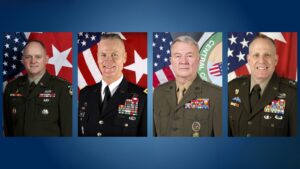 The Citadel’s presidential search committee announces four finalists
The Citadel’s presidential search committee announces four finalists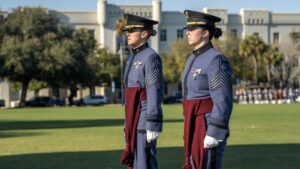 Prestigious Cincinnati and MacArthur awards presented to Citadel cadets
Prestigious Cincinnati and MacArthur awards presented to Citadel cadets


